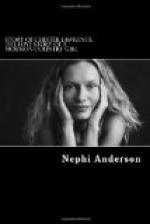“I thought we were to go to Blarney Castle.”
“Sure. I had forgotten. That’s where the Blarney Stone is?”
“Sure,” repeated the girl mischievously.
So that afternoon they set out. It was but a short distance by train through an interesting country. Lucy was the guide again.
“Do you have an Irish language?” asked Chester. “I heard some natives talking something I couldn’t understand.”
“Of course there’s an Irish language,” explained his fair instructor. “Anciently the Irish spoke the Gaelic, a branch of the Celtic. In this reign of Queen Elizabeth, the Irish language was forbidden. The English is now universal, but many still speak the Gaelic. In recent years there has been an awakening of interest in the old tongue. ’One who knows Irish well,’ an Irish historian claims, ’will readily master Latin, French, Spanish, Portuguese, and Italian;’ and he adds that to the Irish-speaking people, the Irish language is ’rich, elegant, soul-stirring, and expressive.’”
“I can well believe the latter statement when I remember the actions of those using it,” said Chester.
“Here we are,” announced Lucy, as they alighted and walked to the entrance of the park. “It will cost us six pence to get in.”
Chester paid the man at the gate a shilling. The castle loomed high on the side of a hill, its big, square tower being about all that now remains of the ancient structure. A woman was in charge of the castle proper.
“The stone that you kiss is away up to the top,” explained Lucy. “You will have to go up alone, as I dare not climb the stairs. I’ll wait here. But stop a minute; the impressions will be more lasting if you get the proper information first. Here, we’ll sit on this bench while I tell you about the castle.”
Chester readily agreed to this.
“To sentimental people,” began the girl, as she looked straight at the high walls in front, “Blarney Castle is the greatest object of interest in Southern Ireland; and, of course, the Blarney Stone is the center of attraction. It was built by Cormack McCarthy about 1446. Of the siege of the castle by Cromwell’s forces, under Irton, we have the following picturesque account in verse, which, I must say, has a Kipling-like ring.”
She opened her book and read:
“’It was now the
poor boys of the castle looked over the
wall,
And they saw that ruffian,
ould Cromwell, a-feeding on
powder
and ball,
And the fellow that married
his daughter, a-chawing
grape-shot
in his jaw,
’Twas bowld I-ray-ton
they called him, and he was his
brother-in-law.’
“The word ‘Blarney’ means pleasant, deludin’ talk, said to have originated at the court of Queen Elizabeth. McCarthy, the then chieftain over the clan of that name who resided at Blarney, was repeatedly asked to come in from ‘off his keeping.’ He was always promising with fair words and soft speech to do what was desired, but never could be got to come to the sticking point. The queen, it is told, when one of his speeches was brought to her, said: ’This is all Blarney; what he says, he never means.’




